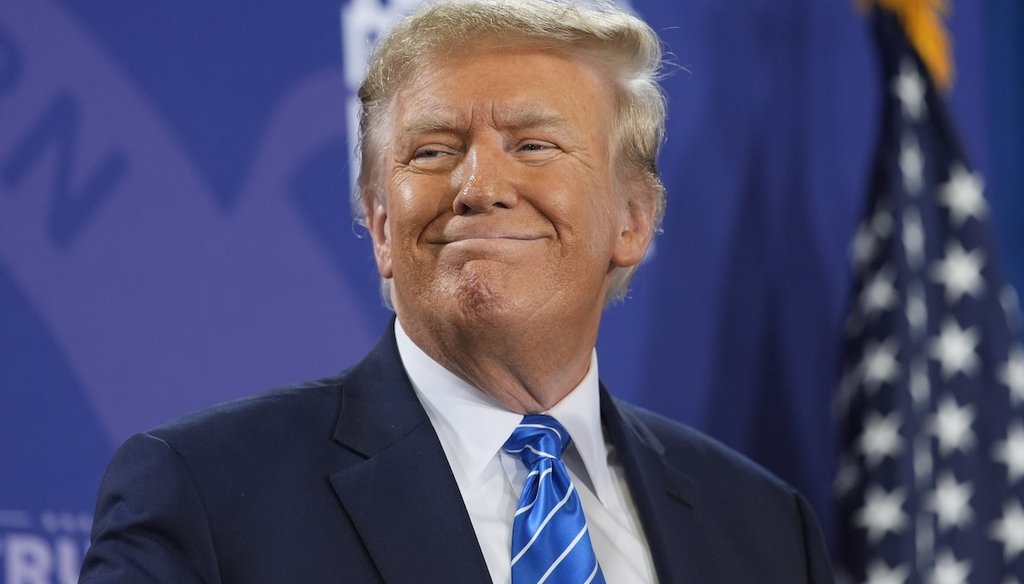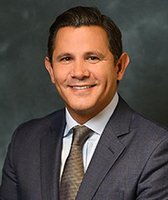Get PolitiFact in your inbox.

Former President Donald Trump speaks at a campaign event on Jan. 27, 2024, in Las Vegas. (AP)
If Your Time is short
- In 2014, following Russia’s illegal annexation of Crimea, North Atlantic Treaty Organization members agreed to spend 2% of their national gross domestic product on defense spending by 2024. Spending has increased since then. As of 2023, 11 countries met that goal.
-
Experts said Russia President Vladimir Putin’s actions in 2014 and 2022 in Ukraine spurred the defense spending increases.
-
Our mission: Help you be an informed participant in democracy. Learn more.
Republican presidential candidate Donald Trump spurred international alarm when he said he would "encourage" Russia to "do whatever the hell they want" to a NATO member country that didn’t "pay" for collective defense.
Trump made the comment Feb. 10 at a Conway, South Carolina, rally as he described a conversation with an unnamed NATO country leader during his presidency. Trump used the story to claim that he was tough on NATO and got results, misrepresenting several facts about the alliance and his record in the process.
"I got them to pay up," Trump said. "NATO was busted until I came along. I said, ’Everybody’s gonna pay.’ They said, ‘Well, if we don’t pay, are you still going to protect us?’ I said, ‘Absolutely not.’ They couldn't believe the answer, and you never saw more money pour in."
NATO’s chief, European leaders and President Joe Biden criticized Trump’s remarks, with Biden saying Trump was too friendly to Russian President Vladimir Putin. Some Republicans downplayed what Trump said; others criticized him.
We can’t fact-check whether that conversation happened, but we can examine how and why European defense spending changed under Trump (and other leaders).
First, an important clarification: No countries are "delinquent" on NATO payments. For years, Trump has misrepresented a spending target for each country’s defense as payments owed to the alliance.
"Countries falling short will have weaker defenses than we would like, but they are not delinquent," said Stephen Saideman, a professor at Carleton University's Norman Paterson School of International Affairs.
Many member countries have increased national defense spending since 2014.
But European leaders were probably thinking of a leader other than Trump.
"If any one person is responsible for getting Europeans to spend more on defense, it’s Vladimir Putin," wrote Ivo Daalder, president of the Chicago Council on Foreign Affairs, and a U.S. Permanent Representative to NATO during part of the Obama administration. "Not Donald Trump."
We contacted Trump spokespeople and got no response.
John Bolton, who was Trump’s national security adviser in 2018 and is now a Trump critic, told The Washington Post that Trump pressed NATO partners aggressively to increase military spending, "but he didn’t say anything about not defending anybody against Russia."
NATO, formally the North Atlantic Treaty Organization, was created in 1949 to provide collective security against the Soviet Union. The alliance has 31 members, including the United States.
The alliance agreed that an armed attack against one or more of them would constitute an attack against them all, and each member would take action, including armed force.
NATO countries do not pay money into a broad NATO defense budget; each country determines its own level of military spending.
In 2014, after Russia’s illegal annexation of Crimea, NATO’s heads of state and government agreed to spend 2% of their GDP on defense by 2024, a target that had been discussed for many years.
The agreement was aspirational, not binding. Countries are not "delinquent" if they’ve missed that target.
"They're welching on a commitment, but there is no enforcement mechanism," said Justin Logan, Cato Institute director of defense and foreign policy studies.
The 2% target is "about each country investing in their own defense so that the alliance as a whole could be stronger, better able to deter or defeat various threats (mostly Russia)," Saideman said.
NATO wasn’t "busted" when Trump became president in 2017.
NATO defense spending has been increasing since the 2014 Crimea annexation, and spending accelerated after Russia further invaded Ukraine in 2022, Jeremy Shapiro, the European Council on Foreign Relations’ research director, told PolitiFact.
Justin Logan, the Cato Institute’s defense and foreign policy studies director, said Russia’s attacks and Trump’s statements affected the allies’ spending decisions.
"Poland’s skyrocketing spending, for instance, has everything to do with fear of Russia," Logan said. Poland increased its defense spending as a share of GDP from about 2.4% in 2022 to 3.9% in 2023.
As of July 2023, NATO reported that 11 countries met the 2% GDP goal: Estonia, Finland, Greece, Hungary, Latvia, Lithuania, Poland, Romania, the Slovak Republic, the United Kingdom and the United States.
Secretary General Jens Stoltenberg said Feb. 14 that he expects 18 allies to spend 2% of GDP on defense in 2024 — a sixfold increase since 2014, when only three allies met the target.
"Politically, meeting the 2% level keeps your country out of the spotlight and in a general state of political grace," Logan said, "which is why so many tiny and vulnerable East European countries do so."
Logan offered caveats about focusing on the 2%-of-GDP target.
Two percent "of the German economy is more than double the entire Estonian economy," pointing to GDP.
Many of the members meeting the target — Estonia, Latvia, Lithuania and Slovakia — offer almost no usable military power.
"France and Turkey, which don’t meet the 2% standard, have far more firepower than most of those who meet the standard," Logan said.
Trump is wrong to say that his threats alone prompted NATO allies to increase defense funding. The Barack Obama and Biden administrations also called for increased European defense spending.
"It is impossible to say whether Trump’s threats had more of an impact than Obama and Biden’s appeals to solidarity," Shapiro said.
Biden and top officials have supported the 2% target. When Biden met with Stoltenberg in June 2023, Biden said, "We’re going to be building on that momentum, from working to ensure that Allies spend enough on the defense, the 2 percent — not just as a hike, but that’s the bottom line."
Every American president since Harry S. Truman urged European allies to do more, Daalder wrote. "Trump was hardly the first. Nor the last."
RELATED: All of our fact-checks about foreign policy
RELATED: More than 1,000 fact-checks of Donald Trump
PolitiFact Senior Correspondent Louis Jacobson contributed to this article.
Our Sources
C-SPAN, Former President Donald Trump in Conway, South Carolina, Feb. 10, 2024
NATO, Defence expenditures and NATO’s 2% guideline, Sept. 27, 2023
NATO, Defence Expenditure of NATO Countries (2014-2023)
NATO, Defence spending: sustaining the effort in the long-term, July 3, 2023
NATO, Secretary General welcomes unprecedented rise in NATO defence spending, Feb. 14, 2024
The Atlantic, The Obama doctrine, April 2016
Ivo Daalder, Trump is wrong about NATO, Feb. 11, 2024
Carnegie Europe, The politics of 2%, September 2015
The Hill, Trump’s NATO threats split GOP, Feb. 12, 2024
Missouri Independent, Some GOP senators shy away from Trump threat he won’t aid ‘delinquent’ NATO allies, Feb. 12, 2024
CNN, NATO chief says Trump’s comments on abandoning alliance endangers US and European troops, Feb. 12, 2024
Radio Free Europe, NATO Can't Be 'A La Carte,' Borrell Says As Allies Blast Trump's Comments, Feb. 12, 2024
White House, Press Conference by President Obama, European Council President Van Rompuy, and European Commission President Barroso, March 26, 2014
White House, Remarks by President Obama and President Ilves of Estonia in Joint Press Conference, Sept. 3, 2014
White House, On-the-Record Press Gaggle by NSC Senior Director for Europe Amanda Sloat on the President’s Trip to Europe, July 12, 2023
White House, Remarks by President Biden and NATO Secretary General Jens Stoltenberg Before Bilateral Meeting, June 13, 2023
White House, Remarks by President Biden in Press Conference | Madrid, Spain, June 30, 2022
White House, Remarks by President Biden on Senate Passage of the Bipartisan Supplemental Agreement, Feb. 13, 2024
New York Times, Favoring Foes Over Friends, Trump Threatens to Upend International Order, Feb. 11, 2018
Washington Post, Trump’s NATO-bashing comments rile allies, rekindle European fears, Feb. 11, 2024
Factcheck.org, Trump’s Distorted NATO ‘Delinquent’ Comments, Feb. 12, 2024
AP, How Trump urging Russia to invade ‘delinquent’ NATO members distorts how the alliance works, Feb. 12, 2024
PolitiFact, "Fact-check: Donald Trump says Germany owes 'vast sums of money to NATO,’" July 10, 2017
PolitiFact, Trump falsely claims NATO countries owe United States money for defense spending, July 11, 2018
PolitiFact, John Kerry rebuts Trump, says NATO spending was up, not down, July 12, 2018
PolitiFact, Trump furthers NATO's spending trend, Jan. 7, 2019
Email interview, Jeremy Shapiro, research director of the European Council on Foreign Relations. Feb. 12, 2024
Email interview, Justin Logan, director of defense and foreign policy studies at the Cato Institute, Feb. 12, 2024
Email interview, Matthias Eichenlaub, NATO spokesperson, Feb. 12, 2024
Email interview, Stephen Saideman, a professor at Carleton University's Norman Paterson School of International Affairs, Feb. 13, 2024
































